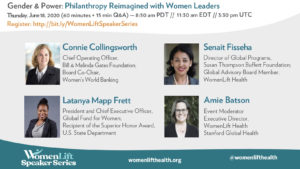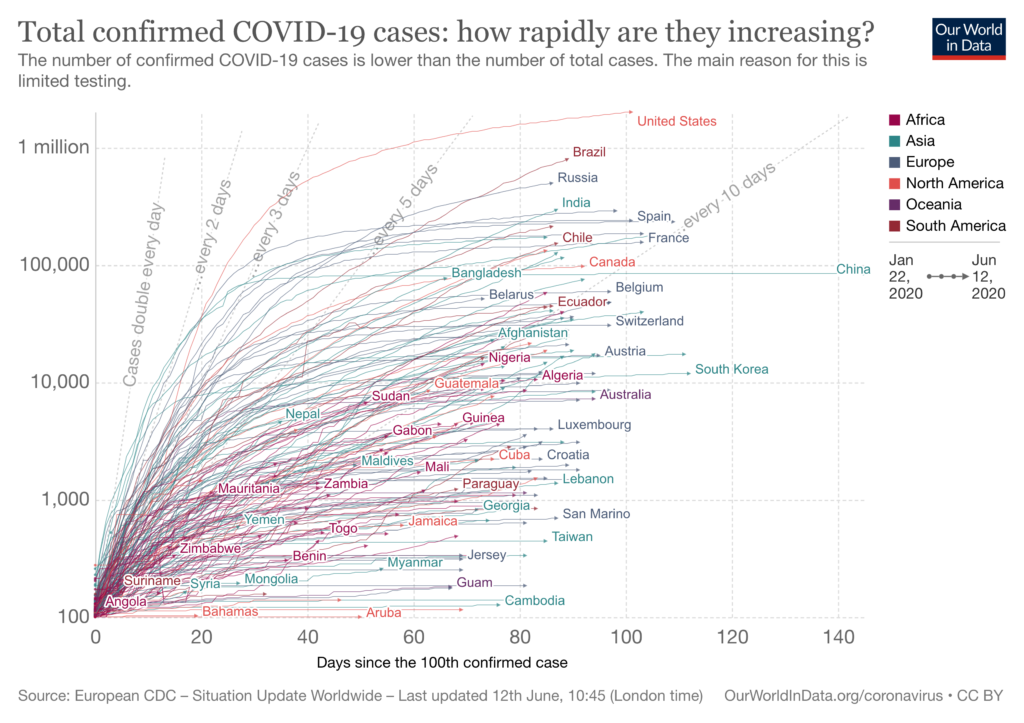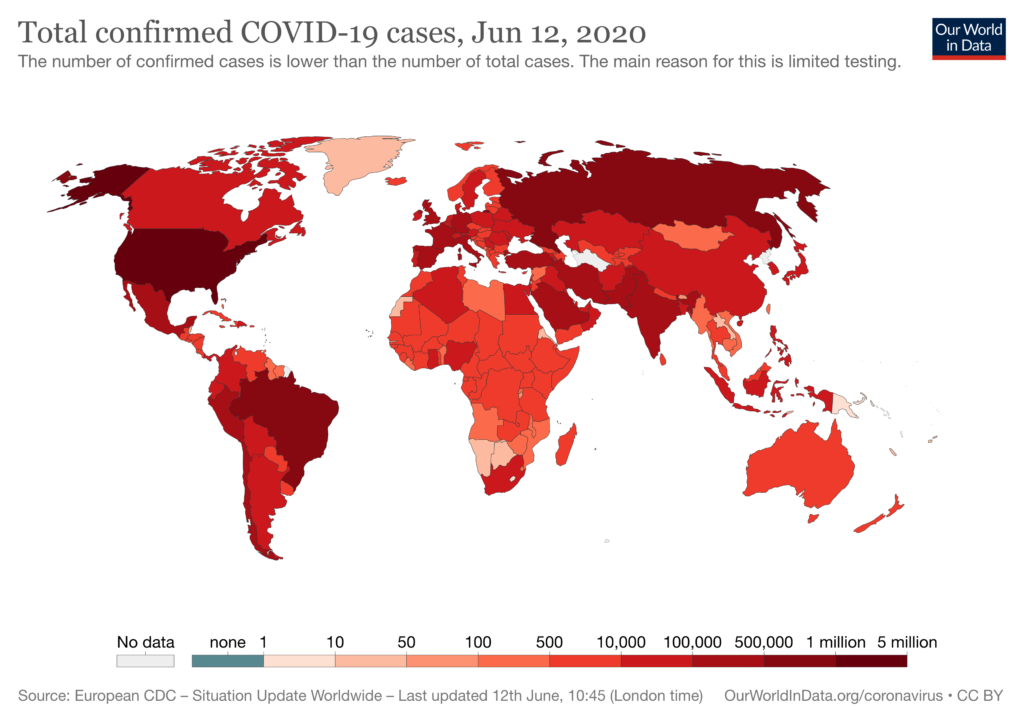Published: 06/16/2020
Dear Global Health Colleagues,
With over 7 million cases, 400,000 deaths from COVID-19, and people all over the world protesting for an end to structural racism, we are in the midst of two life-threatening pandemics. Our Center acknowledges the lethal threats of both, which disproportionately affect minorities worldwide.
We hope this newsletter will shed light on both of these global pandemics and encourage action and activism. Featured below are several articles on the effect of COVID-19 on minorities and the inextricable links between health outcomes and racial inequality in the US and other countries.
We are deeply committed to justice and in an effort to bring change through action, I have been working with the National Association of Criminal Defense Lawyers to release recommendations for safe criminal court reopening in the era of COVID-19. This report acknowledges that criminal court reopening must not abridge rights or exacerbate historical failures of the criminal legal system.
Our Faculty Fellow John Openshaw has been doing some fantastic work on human rights and COVID-19; I encourage you to read his paper on COVID-19 outbreaks in US immigrant detention centers, and sign a petition here.
We are also pleased to announce that the new Stanford/London School of Hygiene & Tropical Medicine Fellowship in Human and Planetary Health is now accepting applications! Deadline is July 15. For more information and a link to the application form, visit our website.
Lastly, I would like to highlight an unusually relevant article regarding the differing resiliencies of African countries to COVID-19 – and I would like to invite you to join the next WomenLift Health Speaker Series: “Gender & Power: Philanthropy Reimagined with Women Leaders next Thursday.
In solidarity,
Michele Barry
Drs. Ben and A. Jess Shenson Professor of Medicine and Tropical Diseases
Director of the Center for Innovation in Global Health
Senior Associate Dean for Global Health, Stanford University
Continue to monitor the following reliable websites for the global situation:
NIH/NLM | LitCovid—–LitCovid is a curated literature hub for tracking up-to-date scientific information about the 2019 novel Coronavirus. It is the most comprehensive resource on the subject, providing a central access to relevant articles in PubMed. The articles are updated daily and are further categorized by different research topics and geographic locations for improved access.
The Strategic Analysis, Research & Training (START) Center provides a succinct summary of the latest scientific literature. To subscribe click here.
Resources
Global Trends and Topics
COVID-19, Quarantines, Sheltering-in-Place, and Human Rights: The Developing Crisis (6/5/20): This article, by CIGH Faculty Fellow John Openshaw, examines how public health measures like quarantines and sheltering-in-place can erode human rights.
Address ‘appalling impact’ of COVID-19 on minorities, UN rights chief urges (6/2/20): This news article features some of the ways COVID-19 disproportionately impacts minority groups around the world.
Health Disparities are a Symptom of Broader Social and Economic Inequities (6/1/20): This article highlights how health disparities, including disparities related to COVID-19, are symptoms of broader underlying inequities.
Regional News
Covid-19 hot spots appear across Latin America (6/1/20): This paper in BMJ describes how Latin American countries are hot spots for COVID-19.
The South African Response to the Pandemic (5/29/20): This paper categorizes the South African response to COVID-19 in different stages.ovation and sustained containment, that will need to be leveraged in order to combat the next phase of the COVID-19 pandemic in African countries.
Mental Health of Young Physicians in China During the Novel Coronavirus Disease 2019 Outbreak (6/1/20): This research letter describes the mental health effects on young Chinese physicians working during COVID-19.
Domestic Underserved Populations and Health Disparities
Sharpening the global focus on ethnicity and race in the time of COVID-19 (5/8/20): This comment in The Lancet showcases the importance of examining and understanding ethinic and racial disparities in the time of COVID-19.
Informal home care providers: the forgotten health-care workers during the COVID-19 pandemic (6/1/20): This Lancet comment focuses on informal home care providers as crucial health-care providers and calls for making them a research priority.
Description of COVID-19 in HIV-infected individuals: a single-centre, prospective cohort (5/28/20): This observational prospective study compares and describes the characteristics of HIV-infected individuals with COVID-19 with a sample of HIV-infected individuals assessed before the pandemic.
Hospitalization and Mortality among Black Patients and White Patients with Covid-19 (5/27/20): This retrospective cohort study examines the hospitalization and mortality rates of black and white patients in Louisiana, US.
Notes from the Field

HIV, Mental Health & COVID-19 Pandemic: A Triple Time-Ticking Bomb; Reflections from Zimbabwe by Dr. Jermaine Dambi, Global Health Equity Scholars Fogarty LMIC Fellow at University of Zimbabwe
The COVID-19 pandemic has exacerbated the high, dual burden of HIV and common mental disorders. Common mental disorders such as depression, anxiety, post-traumatic stress disorders are likely to increase post-COVID pandemic. The absence of social safety nets, poverty, food insecurity, impairment of social and occupational functioning (e.g. loss of income and recreation opportunities), and uncertainty are likely to predispose the Zimbabwean population to poor mental health as in other low-resourced settings. The effects could be higher for people living with HIV.
With an unemployment rate of up to 90%, the Zimbabwean economy is mainly informal. Consequently, the lockdown measures have resulted in a loss of income further predisposing most people into extreme poverty. For example, the UN projects that up to 4.3 million of Zimbabweans (25% of the population) require food aid. Unfortunately, food insecurity is a salient barrier for poor mental health functioning and is linked to poor treatment outcomes in people living with HIV/AIDS. There is a need for a multisectoral approach to provide social safety nets to the vulnerable, especially to people living with HIV.
Despite the current socio-economic challenges, Zimbabwe has a robust HIV care system with people living with HIV/AIDS having to access pharmacological care during the COVID-19 pandemic. However, access to mental healthcare is still suboptimal. As part of my Global Equity Scholars (GHES) fellowship, I am leading a program exploring the utility of digital mental health interventions with the Friendship Bench (FB). The Friendship Bridge is an evidence-based, task-shift based mental healthcare intervention. Digital mental health interventions need to be prioritized to reduce the treatment gap.
The COVID-19 pandemic has resulted in a radical shift in the adoption of healthy behaviors, including exercising and healthy diet across the general population. For example, there has been an increase in engagement in physical activity despite the lack of a safe environment such as pedestrian lanes, street lighting. Ordinarily, activities such as jogging have been culturally viewed as a preserve for the elite. Post-COVID, it is essential to harness the momentum in public health behaviors given the importance of physical activity.

Kuwadzana youths in body workouts as a way of combating effects of the Coronavirus. (Twitter: #TheFeedZW)
Upcoming Events and Lectures
Tuesdays and Thursdays (until June 30) 6:30 AM (PT)
Strategies to Support the COVID-19 Response in LMICs: A Virtual Seminar Series
Johns Hopkins University Webinar Series
The Johns Hopkins Center for Global Health presents a series of short lectures based on our experience treating COVID-19 patients at Johns Hopkins Hospital. Hopkins faculty will talk about their experience and the latest data across key topic areas, and provide resources to help our international partners prepare for the pandemic within their institutions.
Dr. Barry was the selected speaker for the session on June 9, 2020 on gender and COVID-19.
Thursday, June 18, 2020, at 8:30am PT
WomenLift Health Speaker Series: “Gender & Power: Philanthropy Reimagined with Women Leaders”

Philanthropy is a major force in health, development and human rights around the world. Increasingly, philanthropists are realizing that support for gender equity requires a cross-cutting approach and must go beyond funding projects to meet individual women and girls’ needs. COVID-19 – a pandemic with increasingly nonwhite and female knock-on effects – serves as an acute reminder of the ways in which a health issue can play out along both gender and racial lines, and the urgent need for philanthropists to take gender, and its intersections with race, seriously. As philanthropists adapt to this moment and look ahead, there is a critical opportunity to reassess and reimagine how they’re make funding choices. This includes looking at gender and race across their program areas, the make-up of their grantees and within their own organizations – where funding for women of color made up less than 1% of philanthropy and boards are 99% white – to truly empower the women and communities leading the most impactful work on the ground.
Stanford Rebuild
By Stanford Graduate School of Business
CIGH is a co-sponsor of this program. Click here to view a complete list of collaborators.
Stanford Rebuild seeks to encourage and support the world’s innovators and problem solvers to tackle the challenges and opportunities we will face in the coming months. The program organizers believe participants have the potential to significantly accelerate recovery and contribute to a better and more equitable outcome. Participants can spend as much or as little time as they want on the program. The goal is to inspire collective thought and generate solutions. Anyone over 13 years old, anywhere in the world is eligible to apply for Stanford Rebuild. Stanford affiliation and prior entrepreneurial experience are not required. All aspects of Stanford Rebuild are available at no charge.
Thursday, June 25, 2020, 9:30 AM (PT)
COVID-19: The Impact in India
Stanford King Center on Global Development Webinar
Dr. Stephen Luby, Center for Innovation in Global Health’s Director of Research, is a panelist.
India is emerging from the world’s largest lockdown in its fight against COVID-19. What challenges lie ahead for the country’s 1.3 billion residents? How effective has the response from India’s government been and what are the short and longer-term impacts of COVID-19 for India’s citizens and its economy? Hear from experts as they analyze the Indian government’s initial response to COVID-19, as well as how the virus is impacting public programs, businesses and workers, and the health care sector.
*Stanford affiliation needed to attend
* Virtual Session
New Funding Opportunities Specific to COVID-19
USAID: STOP Spillover Call for Proposals
The United States Agency for International Development (USAID) is seeking applications for a cooperative agreement from qualified entities to implement the Strategies To Prevent (STOP) Spillover program. Through STOP Spillover, USAID seeks to reduce the vulnerability of high-risk/low-capacity countries in Asia and Africa to (1) spillover of emerging zoonotic viruses from animal hosts (such as livestock or wildlife) to humans and (2) amplification and spread of these viruses once they have spilled over to humans. See call for proposals.
COVID-19 and Health Disparities Pilot Grants – Stanford Office of Faculty Development and Diversity Call for Proposals
The Office of Faculty Development and Diversity of the Stanford University School of Medicine invites applications for pilot grants in response to the COVID-19 outbreak. These grants are intended to support the advancement of research into the impact of COVID-19 on the wellbeing, health service use, and health outcomes of populations that experience health disparities in the United States.
Online List of COVID-19 Research Opportunities
Stanford’s Research Management Group has created a website that provides a complete listing of funding opportunities for COVID-19 research. The site also provides sponsor and University guidance on grants, clinical trials, and award management impacted by COVID-19.
COVID-19 Research at Stanford
Stanford Medicine scientists have launched dozens of research projects as part of the global response to COVID-19. Some aim to prevent, diagnose and treat the disease; others aim to understand how it spreads and how people’s immune systems respond to it.

